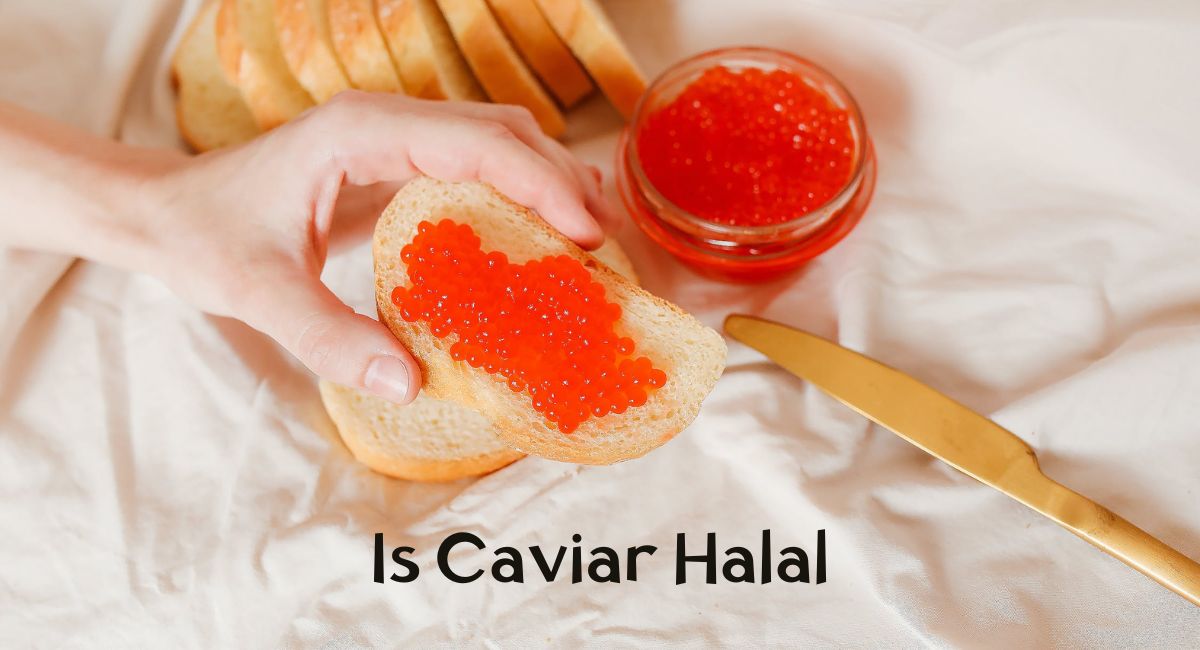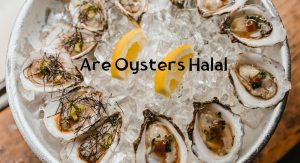Caviar, the luxurious delicacy made from sturgeon roe, is a highly sought-after food item. However, for those following the Islamic faith, the question of whether caviar is halal or permissible to consume arises. The consumption of caviar has been a topic of debate among Islamic scholars and followers, with varying opinions on its permissibility.
The question of whether caviar is halal or not has become more relevant in recent times due to the increasing demand for luxury food items. With more Muslims interested in trying caviar, there is a need for clarity on its permissibility. This article aims to explore the topic of caviar and its halal status, examining the opinions of Islamic scholars and the reasoning behind their positions.
What is Caviar?
Caviar is a delicacy consisting of the processed roe or eggs of sturgeon, a species of fish found in the Caspian and Black Seas. It is considered a luxury food item and is highly valued for its unique taste, texture, and appearance.
The process of making caviar involves carefully removing the eggs from the fish and then washing them with salt to preserve their quality. The eggs are then aged for a period of time, usually between one and three months, to develop their flavor and texture.
Caviar is known for its rich, salty taste and delicate texture. It is a good source of protein and iron, and is often served as an appetizer or garnish in high-end restaurants and at special events.
There are several different types of caviar available, each with its own unique flavor and texture. The quality of caviar can vary depending on factors such as the species of sturgeon, the age of the eggs, and the amount of salt used in the processing.
Are Caviar and Roe the Same Thing?
Caviar and roe are related but not exactly the same thing. While both caviar and roe are fish eggs, there are some differences between the two.
Caviar is a specific type of roe that comes from the sturgeon fish, specifically the Caspian Sea sturgeon. It is highly regarded as a luxury food item and is known for its delicate and rich flavor. Caviar eggs are usually small, glossy, and range in color from light to dark, depending on the species of sturgeon.
On the other hand, roe is a broader term that encompasses the eggs of various fish species. It is a more general term for fish eggs, including those from salmon, trout, herring, and other fish. The flavor, size, and texture of roe can vary depending on the species it comes from. For example, salmon roe, also known as red roe or red caviar, has a softer texture and a distinctive popping sensation when eaten.
Types of Caviar
There are various types and varieties of caviar available, each with its own unique characteristics. Here is a comprehensive overview of the different types:
- Malossol Caviar: Malossol caviar is lightly salted caviar, typically containing around 3.5% to 5% salt content. The term “Malossol” is also used to denote high-quality caviar that is almost unsalted, resulting in a fresh taste.
- Salted Caviar: This method involves adding more salt during the caviar manufacturing process, resulting in a salt content of around 8%. Salted caviar is also known as semi-preserved caviar, and the increased salt content contributes to a longer shelf life.
- Pasteurized Caviar: Pasteurized caviar is created by subjecting the caviar to heat and subsequently placing it in vacuum-sealed packaging. The pasteurization process affects the natural taste of the fish eggs. The aim of pasteurization is to increase the caviar’s shelf life.
- Beluga Caviar: Beluga caviar is considered the rarest and most expensive form of caviar. It comes from the critically endangered beluga sturgeon, which inhabits the Caspian Sea. Beluga caviar is highly prized for its large, delicate eggs and rich flavor.
- Oscietra Caviar: Oscietra caviar, also known as Russian sturgeon caviar (Acipenser gueldenstaedtii), is another popular variety. It is characterized by nutty and smooth flavors and is highly regarded in the culinary world.
- Sevruga Caviar: Sevruga caviar is sourced from the sevruga sturgeon (Acipenser stellatus). It is known for its intense, briny flavor and firm texture.
- Osetra Caviar: Osetra caviar, derived from the osetra sturgeon (Acipenser gueldenstaedtii), is another prized variety. It is often considered a luxurious caviar option with a distinct flavor profile that can range from nutty to buttery.
These are just a few examples of the types of caviar available. The world of caviar is vast and continuously evolving, with new varieties being discovered and introduced over time. It’s important to note that the specific types and availability of caviar may vary depending on the region and supplier.
How is Caviar Made?
Caviar is a delicacy made from the roe, or eggs, of sturgeon fish. The process of making caviar is quite intricate and requires a lot of care and attention to detail. Here is a brief overview of how caviar is made:
- Harvesting: Sturgeon fish are caught and their ovaries are removed. The ovaries are then carefully cleaned to remove any impurities.
- Separating: The eggs are separated from the ovaries and are sorted by size and quality.
- Salting: The eggs are then salted to preserve them and enhance their flavor. The amount of salt used can vary depending on the type of caviar being produced.
- Aging: The eggs are then aged for several months to allow the flavors to develop and mature.
- Packaging: The caviar is then packaged in small tins or jars and shipped to markets around the world.
It is important to note that not all roe is considered caviar. True caviar can only come from sturgeon fish, while other types of fish eggs are often referred to as “roe” or “caviar substitutes.”
In addition, it is worth noting that the process of making caviar can be quite expensive, which is why it is often considered a luxury food item. However, there are many different grades and types of caviar available, so there is something to fit every budget.
Is Caviar Halal?
Caviar is obtained from the eggs of sturgeon fish, and not all species of sturgeon are halal. According to Islamic dietary laws, only fish that have scales are considered halal. Therefore, sturgeon species that do not have scales are not permissible for consumption.
The three most popular sturgeon species used to produce caviar are Beluga, Sevruga, and Osetra. While Beluga and Sevruga do not have scales, Osetra does have scales, making it the only halal sturgeon species.
The opinions of Islamic scholars on the permissibility of caviar under Islamic dietary laws also vary. Some scholars argue that caviar is not halal because it is obtained from non-halal sturgeon species, while others believe that it is permissible because the eggs are not the flesh of the fish. Therefore, it is advisable to consult with a qualified Islamic scholar to determine whether caviar is halal or not.
Additionally, according to a fatwa issued by IslamWeb.net, eating caviar, which is the eggs of fish, is permissible.
It is important to note that the fatwa regarding the permissibility of caviar is specific to the Islamic perspective and may not reflect the views of other religious or cultural traditions. Islamic scholars reach their decisions through extensive research and consultation with experts in the field.
Processing Method and Country of Origin
The method of processing caviar also plays a crucial role in determining its halal status. Caviar is typically processed by adding salt to the eggs, which helps to preserve the quality and flavor of the eggs. However, if the salt used in the processing of caviar is derived from non-halal sources, then the caviar itself becomes non-halal. Therefore, it is essential to ensure that the salt used in the processing of caviar is halal.
The country of origin of the caviar also plays a role in determining its halal status. Caviar produced in Muslim-majority countries like Iran, where halal dietary laws are strictly followed, is more likely to be halal. However, caviar produced in non-Muslim countries like Russia and China may not adhere to Islamic dietary laws and may not be halal.
Nutritional Value and Health Benefits of Caviar
Caviar is a delicacy that is enjoyed by many people around the world. It is made from the eggs of sturgeon, a type of fish found in the Caspian and Black Sea. Caviar is known for its rich, buttery flavor and unique texture. But did you know that it is also packed with nutrients that can benefit your health? Here are some of the key nutritional benefits of caviar:
- High in Protein: Caviar is a great source of protein, which is essential for building and repairing tissues in the body. A single serving of caviar (one tablespoon) contains around 7 grams of protein. This makes it a good choice for people who are looking to increase their protein intake, such as athletes or bodybuilders.
- Rich in Iron: Iron is an important mineral that is needed to produce hemoglobin, a protein found in red blood cells that carries oxygen throughout the body. Caviar is a good source of iron, with one serving providing around 19% of the recommended daily intake. This makes it a good choice for people who are at risk of iron deficiency, such as pregnant women or people with anemia.
- Contains Magnesium and Selenium: Caviar is also a good source of magnesium and selenium, two minerals that are essential for good health. Magnesium is needed for healthy bones, muscles, and nerves, while selenium is important for a healthy immune system and thyroid function.
- High in Good Fats: Caviar is high in omega-3 fatty acids, which are a type of healthy fat that is essential for good health. These fats can help reduce inflammation in the body, lower the risk of heart disease, and improve brain function.
How to Cook Caviar
Caviar is a delicacy that is often served raw as an appetizer or used as a garnish for other dishes. However, it can also be cooked in a variety of ways to create unique and flavorful dishes. Here are some ways to cook caviar:
- Caviar Omelette: Caviar can be added to a classic omelette for a luxurious breakfast or brunch dish. Simply whisk eggs with a splash of cream and season with salt and pepper. Heat a non-stick pan over medium heat and add the egg mixture. When the eggs start to set, sprinkle a generous amount of caviar over one half of the omelette. Fold the other half over the caviar and cook until the eggs are set and the caviar is warmed through.
- Caviar Sauce: Caviar can be used to make a rich and flavorful sauce for fish or pasta dishes. In a small saucepan, melt butter over medium heat. Add minced shallots and cook until softened. Add a splash of white wine and simmer until reduced by half. Stir in a dollop of crème fraîche and a generous amount of caviar. Cook until the caviar is warmed through and the sauce is thickened. Serve over grilled fish or pasta.
- Caviar Dip: Caviar can be used to make a delicious and elegant dip for crackers or vegetables. In a food processor, blend cream cheese, sour cream, and a splash of lemon juice until smooth. Add a generous amount of caviar and pulse until just combined. Season with salt and pepper to taste. Serve with crackers or vegetables.
- Caviar Topping: Caviar can be used to add a touch of luxury to a variety of dishes. It can be sprinkled over deviled eggs, baked potatoes, or blinis with crème fraîche. It can also be used as a topping for sushi rolls or seared tuna. Simply sprinkle a generous amount of caviar over the dish before serving.
Cooking with caviar can add a touch of elegance and sophistication to any dish. With these simple recipes, you can create delicious and impressive dishes that are sure to impress your guests.
Conclusion
In conclusion, the question of whether caviar is halal or not has been a topic of debate among Islamic scholars for many years. While some argue that caviar is haram due to the fact that sturgeon does not have scales, others believe that it is halal since it is not explicitly mentioned as haram in the Quran.
After much deliberation, a fatwa was issued by Islamic scholars stating that caviar is halal as long as it comes from a halal source and is processed in a halal manner. This decision was reached after extensive research and consultation with experts in the field.
It is important to note that not all caviar is halal, and it is the responsibility of Muslims to ensure that they are consuming only halal caviar. This can be done by checking the source of the caviar and ensuring that it is processed in a halal manner.
Frequently Asked Questions
1. Is caviar halal hanafi?
Caviar, which refers to unfertilized salt-cured fish eggs, is considered halal (permissible) according to the Hanafi school of thought in Islam. Imam Ahmed Ibn Hanbal and Imam Shafi also hold the view that all living creatures that live in the sea are halal, including seafood like shrimp, lobster, and crabs. Additionally, eggs from fish are permitted by scholarly consensus (ijma’) unless they become unfit to eat.
2. Is caviar halal shia?
The Ja’fari school of jurisprudence, which predominates in Twelver Shia Islam, generally follows the same dietary rule as the Jewish Kashrut, which requires seafood to have both fins and scales. However, sturgeon, the fish from which caviar is obtained, does not have scales. Therefore, under Shiite law, sturgeon and caviar are haram.
3. Why is caviar is so expensive?
Caviar’s high price is influenced by several factors. Firstly, the rarity and scarcity of sturgeon, the fish from which caviar is obtained, contribute to its high cost. Sturgeon populations have declined due to overfishing and habitat loss. Additionally, the labor-intensive and time-consuming process of harvesting and processing caviar, as well as the skill required for proper maturation and grading, contribute to its expense. Furthermore, the demand for high-quality caviar from luxury markets also influences its pricing.
4. Is caviar good for you?
Caviar can be beneficial for your health as it is rich in various nutrients such as zinc, magnesium, iron, calcium, omega-3 fatty acids, selenium, and vitamin B12. These nutrients support immune health, contribute to healthy blood, aid in skin health, brain function, and may help lower cholesterol levels. However, it’s important to consume caviar in moderation due to its high calorie content.
5. Is caviar vegetarian?
No, caviar is not considered vegetarian. Caviar is made from fish eggs, specifically sturgeon eggs. As it comes from an animal source, it does not align with a vegetarian diet.
6. Is caviar kosher?
Not all types of caviar are considered kosher. For caviar to be kosher, it must meet specific requirements outlined in Jewish dietary laws. These requirements include the use of kosher fish and adhering to specific preparation methods supervised by a kosher authority.
7. Does caviar taste good?
The taste of caviar is subjective and can vary depending on the type, grade, and individual preferences. Caviar is known for its unique and distinct flavor. It can have a briny, buttery, or nutty taste, and the texture can range from smooth to slightly grainy.








